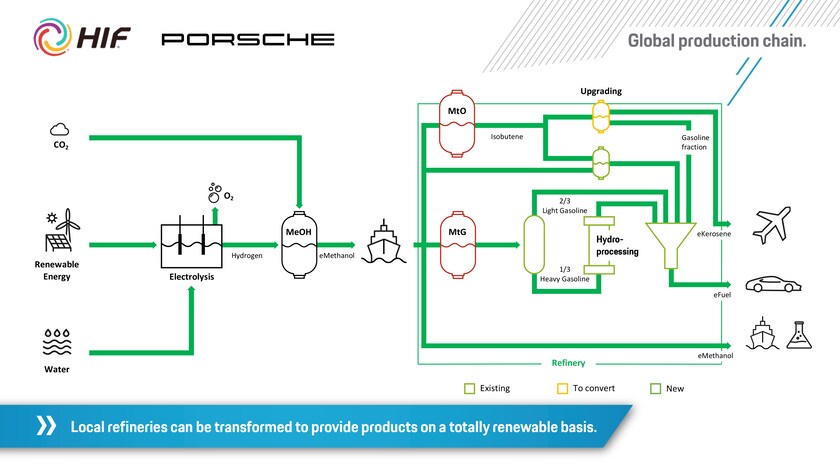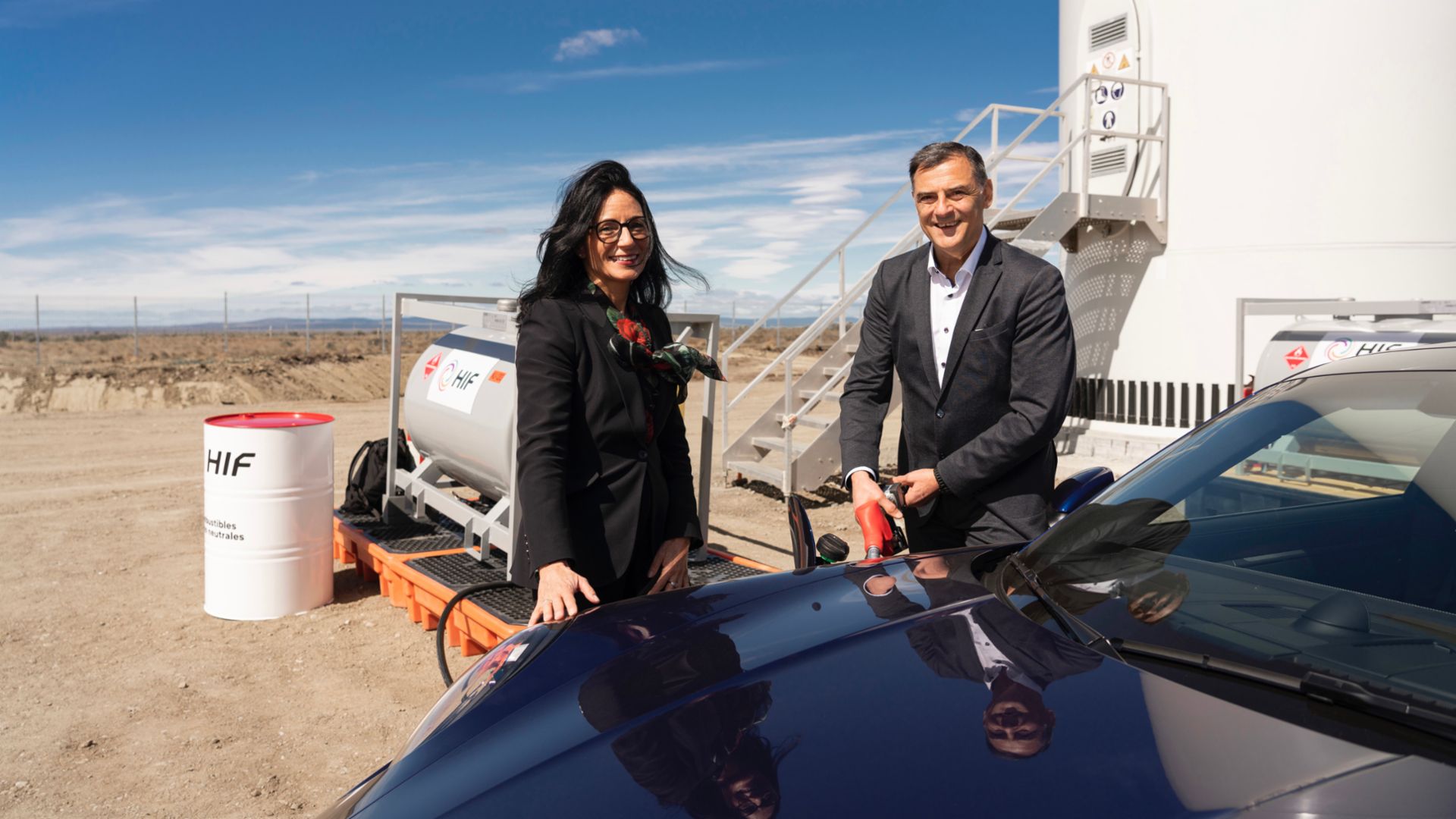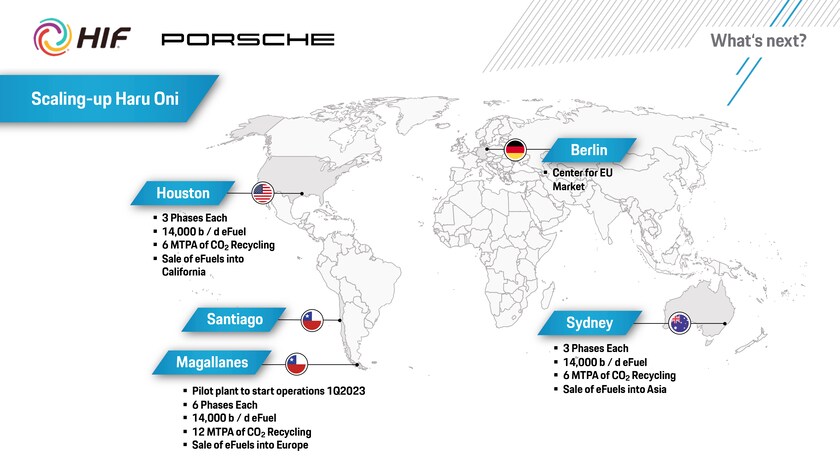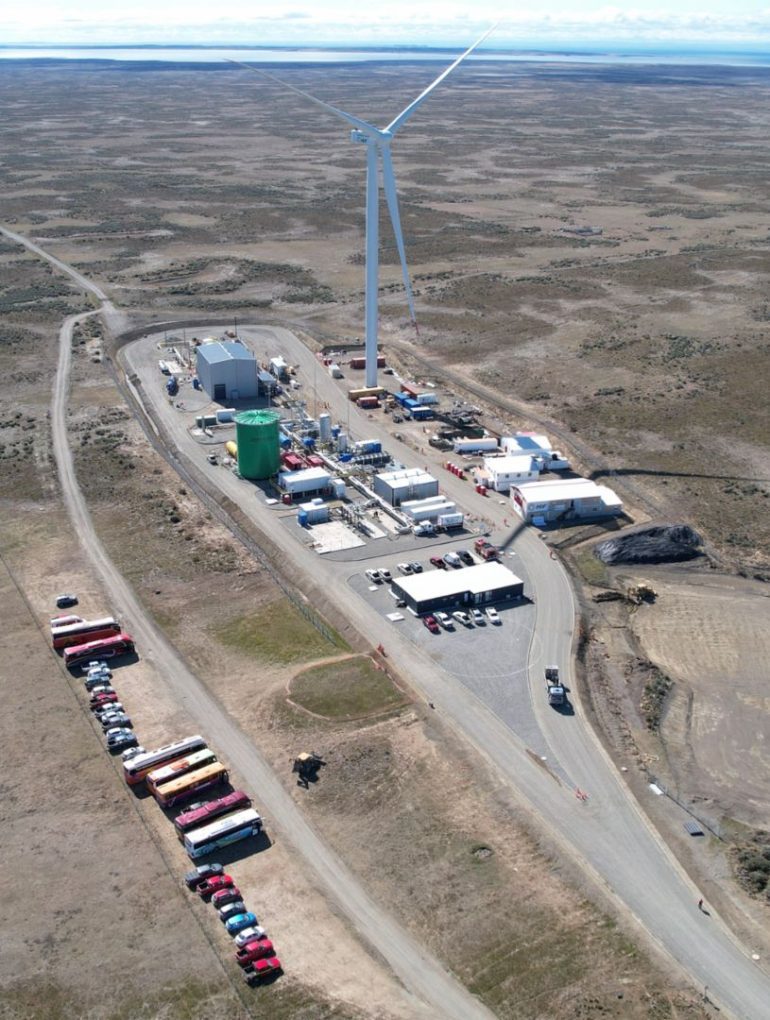Late last year, Porsche officially unveiled its new eFuels “Haru Oni” pilot plant in Chile. In primary partnership with Chilean operator, Highly Innovative Fuels (HIF), this also kicked off the beginning of the German automaker’s foray into the industrial production of synthetic/bio fuels.
What Are eFuels & How Are They Being Made?
“eFuels” is Porsche’s own nomenclature for what are actually synthetic fuels (often referred to as bio fuels). Porsche utilizes the facility to produce eFuels using a process powered by wind turbines, which refines water and carbon dioxide into a motor-grade fuel.

In application, the only distinction between eFuels and traditional petrol is in the emissions produced through each of their refinement processes. While the latter will emit pollutants into the atmosphere, eFuels production only releases byproducts such as oxygen and other lighter, less toxic gasses which can more easily be captured.
To start with, this makes eFuels production much more environmentally friendly to begin with, while also setting up an attainable path towards the operation of truly net-zero CO2 automobiles*. It could even have applications for other modes of transport, such as airplanes and semi trucks.
Furthermore, the chemical structure of eFuels is indistinguishable from that of conventional gasoline, meaning that they can be used with existing internal combustion technologies and an overhaul of engine blueprints being used today won’t be necessary.
*to further clarify: yes, this is very much an altruistic endeavor—eFuels are being produced for use in all automobiles, not just Porsches.
Why Porsche Is Betting Big On eFuels
It’s already clear looking through a scientific lens—and by proxy, an environmental one, too—that eFuels can function as a direct replacement for conventional gasoline and cater like-for-like to anything that currently uses it. It looks to be a “win-win scenario”, in every sense of the phrase.
Porsche has already been piloting synthetic fuels in its motorsport programs with great success, proving that eFuels are every bit as legitimate as anything else powering the world’s highest performing cars, within the most demanding environments. The company has further plans to showcase the new technology through Porsche Experience Centers around the world.

“The potential of eFuels is huge.” states Michael Steiner, Member of the Executive Board for Development and Research at Porsche AG. “There are currently more than 1.3 billion vehicles with combustion engines worldwide. Many of these will be on the roads for decades to come, and eFuels offer the owners of existing cars a nearly carbon-neutral alternative. As the manufacturer of high-performance, efficient engines, Porsche has a wide range of know-how in the field of fuels.”
Real-world Testing On-site
Motortrend just published an amazing article which chronicled their recent tour of the Haru Oni plant and covers a lot of the technical details of the facility and how it operates. I highly encourage you to have a read, as it’s filled with some really fascinating literature.
Not one to be taken just on their word, Porsche also had Motortrend journalist, Frank Markus, take a Porsche Panamera—of which traditional and hybrid versions were made available—for a spin through the nearby and picturesque Torres del Paine National Park.

Markus noted that he, along with other journalists, were not able to perceive any tangible differences in how the cars performed, drove or felt compared to their conventionally fueled counterparts. This further reiterates the concept that neither human nor automobile can tell the difference between eFuels and traditional gasoline, and that the world can be better off because of this.
Next Steps & My Thoughts
At the moment, the true viability of global eFuel production and consumption is anecdotal at best, though that’s to be expected with a pilot project that’s still in its fledgling stages. Before we can even begin to start measuring this, things would need to scale to levels which would allow for worldwide focus group implementation.
Then there’s the ultimate and eventual issue of commercialization, which would require a globally concerted effort towards maximizing economies of scale—ideally to the point that a unit of eFuels is no more expensive than that same unit of conventional petrol.
As what is essentially a standalone project, the process to produce eFuels at Haru Oni is very expensive by today’s consumer pricing standards. Markus stated that, as things currently stand, it would cost around $45 USD to produce one gallon of synthetic fuel.

He also remarked that a seamless, behind-the-scenes sort of introduction of eFuels into the current gasoline stock—essentially phasing it out—is on the cards as well. With this strategy, eFuels would quietly replace the entire supply without consumers ever having to fundamentally change their habits or what they pay at the pump (if it ends up being cheaper that would be great too, but one thing at a time).
Without diminishing the significance or role that EVs will play in the more distant future—Michael Steiner reaffirmed that eFuels research does not change Porsche’s directive to convert 80% of its lineup to EVs by 2030—perhaps an optimally balanced coalition of green fuels and fully-electric solutions is not only better for business, but for the environment too.
It looks as though Porsche is already creating a model for how this could work, and if the science and economics (and sadly, politics) behind eFuels checks out, then there’s no reason that it couldn’t become part of the conventional formula in the years to come. If you’ve ever been (proudly) labelled anything along the lines of “car enthusiast”, “driving purist” or “vintage road racer”, I believe this would be the outcome you should be rooting for.




